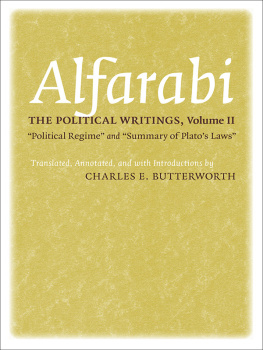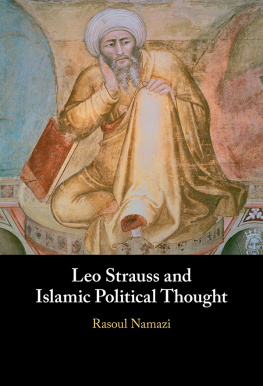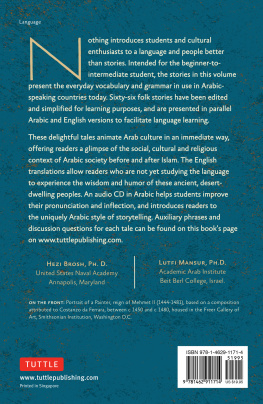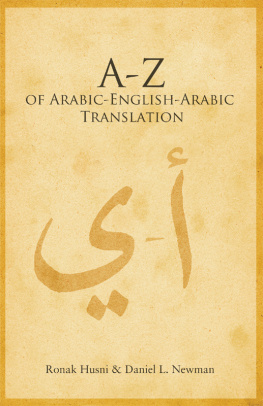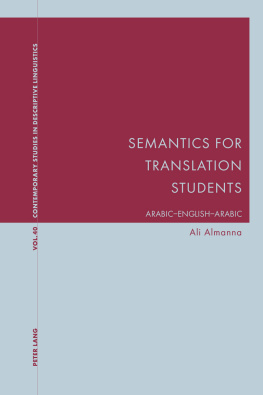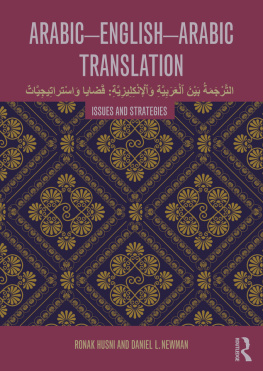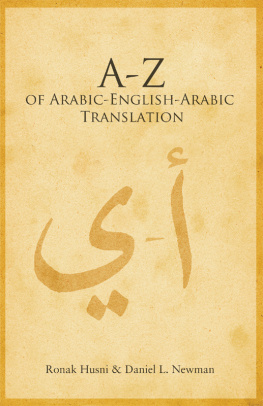
For Muhsin S. Mahdi, who taught by showing what could be done
Preface
beyond the Oxus Rivereither in Farab, Kazakhstan, or Faryab, Turkestan. In the course of his life, Ab Nar Muammad Ibn Muammad Ibn Tarkhn Ibn Awzalagh al-Frb moved often and thus resided in Bukhara, Marv, Haran, Baghdad, Constantinople, Aleppo, Cairo, and Damascus. The son of an army officer in the service of the Samanids, Alfarabi studied Islamic jurisprudence and music in Bukhara. He then journeyed to Marv where he studied Aristotelian logic with Nestorian Christian monks, most notably, Yann Ibn ayln.
While in his early twenties, he left Marv for Baghdad, where he continued to study logic with Ibn ayln. It is said that he began to study philosophy there by following the courses of the famous Nestorian Christian translator and student of Aristotle, Matt Ibn Ynus. At the same time, he improved his grasp of Arabic by studying with the prominent philologist Ibn al-Sarrj.
Around 905/293 or 910/298, Alfarabi traveled from Baghdad to Byzantium (perhaps reaching Constantinople) to study Greek sciences and philosophy. He remained there for about eight years and then returned to Baghdad where he busied himself with teaching and writing. In about 942/330, political upheavals prompted him to leave Baghdad for Damascus. While in Damascus, he visited Aleppo. A few years later, political
Alfarabis learning was such that he came to be widely acclaimed as the second teacher, that is, second after Aristotle. Surely the most important philosopher within the Arabic-Islamic tradition, Alfarabi writes in a charming yet deceptively subtle style and couches his observations in simple language and straightforward declarative sentences. Most often, he sets forth an apparently unobjectionable story about natural and conventional things. As the exposition unfolds, it becomes apparent that Alfarabi has accounted for the natural world, political leadership, prophecy, moral virtue, civic order, the organization of the sciences, even the philosophic pursuits of Plato or Aristotlein short, all the major subjects of interest to humans. He enumerates the reasons for which human beings associate, how civic life can best be arranged to meet the highest human needs, the ways most actual regimes differ from this best order, and why philosophy and religion nonetheless deem it best. These writings, extraordinary in their breadth and deep learning, extend through all the sciences and embrace every part of philosophy.
Alfarabi qualifies as the founder of Arabic-Islamic political philosophy because he is the first to explore the challenge to traditional philosophy presented by revealed religion, especially in its claims that the Creator provides for human well-being by means of an inspired prophet-legislator. This is especially evident in his two accounts of the old political science in the last chapter of the explicitly popular Enumeration of the Sciences. Both presuppose the validity of the traditional separation between practical and theoretical science, but neither is adequate for the radically new situation created by the appearance of revealed religion. The two accounts explain in detail the actions and ways of life needed for sound political rule to flourish, but are silent about opinionsespecially the kind of theoretical opinions set forth in religionand thus unable to point to the kind of rulership needed now that religion holds sway. Nor can either speak about the opinions or actions addressed by the jurisprudence and theology of revealed religion. These tasks require a political science that combines theoretical and practical science along with prudence and shows how they are to be ordered in the soul of the ruler.
In his Book of Religion, Alfarabi outlines this broader political science. He speaks of religious beliefs as opinions and of acts of worship as actions, noting that both are prescribed for a community by a supreme ruler or prophet. His new political science views religion as centered in a political community whose supreme ruler seems identical with the founder of a religion. Indeed, the goals and prescriptions of the supreme ruler are those of the prophet-lawgiver. All that is said or done by this supreme ruler finds justification in philosophy, and religion thus depends on philosophytheoretical as well as practical. Similarly, by presenting the art of jurisprudence as a means to identify particular details the supreme ruler failed to regulate before his death, Alfarabi makes it depend on practical philosophy and thus to be part of this broader political science. In sum, his new political science offers a comprehensive view of the universe and identifies the practical acumen that permits the one possessing this understanding, either the supreme ruler or a successor endowed with his qualities, to rule wisely. Able to explain the various ranks of all the beings, this political science also stresses the importance of religion for uniting the citizens and for helping them attain the virtues that prolong decent political life. In the Political Regime and Principles of the Opinions of the Inhabitants of the Virtuous City, Alfarabi further illustrates the new opinions. Their core argument is best stated in the Attainment of Happinessthe first part of his famous trilogy, the Philosophy of Plato and Aristotleby his declaration that the idea of the philosopher, supreme ruler, prince, lawgiver, and imam is but a single idea.
In all these writings, the exposition is seamless. However unusual or at variance with common assumptions the account may seem, it is presented as though it were unobjectionable. Only in two writingsSelected Aphorisms and Summary of Platos Lawsdoes Alfarabi provide a glimpse into differences of opinions with respect to these various teachings. That is to say, Alfarabis public teaching respects the conventional opinions of his time and place. He also has another teaching at variance with this public teachingwhat might be called a private teachingthat points to the shortcomings in the accepted opinions. Although he never explicitly admits to such a teaching, his rich explanation of Platos indirectness prompts the suspicion that he follows a similar procedure in his own writing. To grasp its contours, one must make sense of each of these writings and discern how they relate to one another.
It is therefore a special pleasure to present this translation of the Political Regime along with the Summary of Platos Laws as a complement to Muhsin Mahdis translation of the Philosophy of Plato and Aristotle, already noted, as well as the recent translation of the Selected Aphorisms, chapter 5 of the Enumeration of the Sciences, and Book of Religion, plus the ever enigmatic Harmonization of the Two Opinions of the Two Sages, Plato the Divine and Aristotle. Moreover, it is now possible to announce that these three volumes will soon be followed by two others, one providing a complete translation of the Book of Letters and the other a new translation of the Virtuous Citythe former accompanied by the critical new Arabic edition that Muhsin Mahdi prepared before his death, but never saw into print. Desirable as it might seem to pair the translation of the Political Regime with that of the Virtuous City, given their many parallels and similarities, the juxtaposition of the former with the Summary of Platos Laws in the present volume permits thoughtful readers to consider Alfarabis transition from a discussion of what might be to what can be, much as Plato did in the Republic and the Laws. With the appearance of this volume, then, all who are desirous of learning about Alfarabis political teachingable to read Arabic or notwill have accurate presentations of his basic political texts at their disposal.
Next page
